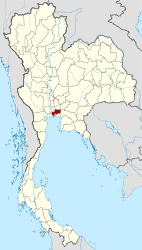 Bangkok (English pronunciation: /ˈbæŋkɒk/[6]) is the capital and the most populous city of Thailand. It is known in Thai as Krung Thep Maha Nakhon (กรุงเทพมหานคร, pronounced [krūŋ tʰêːp mahǎː nákʰɔ̄ːn] ( listen)) or simply About this sound Krung Thep (help·info). The city occupies 1,568.7 square kilometres (605.7 sq mi) in the Chao Phraya River delta in Central Thailand, and has a population of over 8 million, or 12.6 percent of the country's population. Over 14 million people (22.2 percent) live within the surrounding Bangkok Metropolitan Region, making Bangkok an extreme primate city, dwarfing Thailand's other urban centres in terms of importance.
Bangkok (English pronunciation: /ˈbæŋkɒk/[6]) is the capital and the most populous city of Thailand. It is known in Thai as Krung Thep Maha Nakhon (กรุงเทพมหานคร, pronounced [krūŋ tʰêːp mahǎː nákʰɔ̄ːn] ( listen)) or simply About this sound Krung Thep (help·info). The city occupies 1,568.7 square kilometres (605.7 sq mi) in the Chao Phraya River delta in Central Thailand, and has a population of over 8 million, or 12.6 percent of the country's population. Over 14 million people (22.2 percent) live within the surrounding Bangkok Metropolitan Region, making Bangkok an extreme primate city, dwarfing Thailand's other urban centres in terms of importance.Bangkok traces its roots to a small trading post during the Ayutthaya Kingdom in the 15th century, which eventually grew in size and became the site of two capital cities: Thonburi in 1768 and Rattanakosin in 1782. Bangkok was at the heart of Siam's (as Thailand used to be known) modernization during the later 19th century, as the country faced pressures from the West. The city was the centre stage of Thailand's political struggles throughout the 20th century, as the country abolished absolute monarchy, adopted constitutional rule and underwent numerous coups and uprisings. The city grew rapidly during the 1960s through the 1980s and now exerts a significant impact among Thailand's politics, economy, education, media and modern society.






